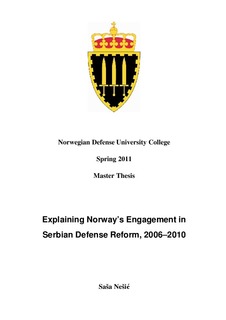Explaining Norway's engagement in Serbian Defense Reform, 2006-2010
Master thesis
Permanent lenke
http://hdl.handle.net/11250/100016Utgivelsesdato
2011Metadata
Vis full innførselSamlinger
- Masteroppgaver [466]
Sammendrag
Shortly after the breakdown of the Eastern Block and Yugoslavia in early 1990s, it became obvious to the international community that security sector actors and the armed forces in particular, pley an important role in the development and democratization of transitionstates. Defense reform concept emerged, and many Western states participated to assist transition-states. After the democratic changes in Serbia in 2000, Norway was among the first to recognize that external actors should have a significant role in Serbian defense reform. This thesis is about defense reform as a component in the broader Security Sector Reform (SSR) concept. It has a donor-state focus and deals with possible explanations for donor-states’ engagement in defense reform processes. It explores the rationale behind Norway’s engagement in Serbian defense reform, interpreted in the light of the IR theories of neorealism and neoliberalism. The research was directed to answer the following question: How can Norway’s engagement in Serbian defense reform be explained? Thesis examines defense reform through one case study – Norway’s engagement in Serbian defense reform. It concludes that Norway’s engagement first at all can be explained through the lenses of neoliberalism, as it contributes to the expansion of Zone of liberal peace. However, there are also some effects that can justify that engagement from a neorealist standpoint.
